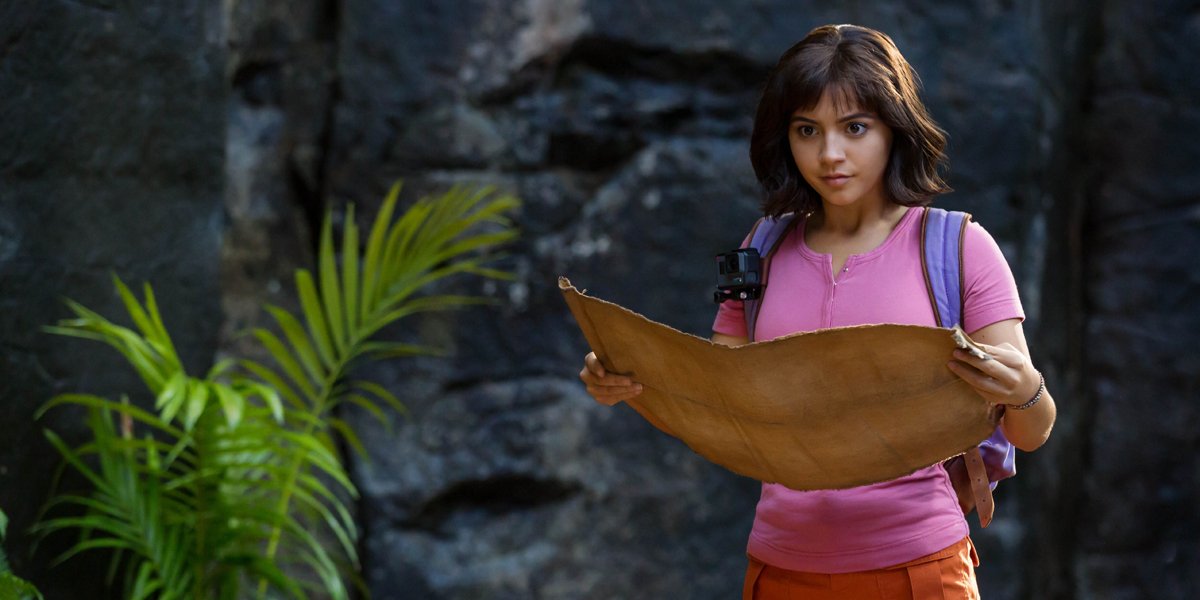By the nature of it being a live-action adaptation of the hit children’s animation series Dora The Explorer, James Bobin’s Dora And The Lost City Of Gold is not a film that should generate high expectations among adult audiences. Its primary target is quite clearly younger kids who just want to see a colorful, silly adventure play out of the big screen, and really it’s only job beyond that is not being too painful an experience for the guardians/chaperons that bring said younger kids to the theater.
In this capacity it’s a movie that mostly succeeds – but there is a frustrating side to it as well. This is because the film actually starts out by succeeding in being more than just a “kid’s movie” by going full bore with weirdness and goofiness. But after its first act it loses its spirit, and becomes something much more typical and ordinary.
This adaptation brings Dora (Isabella Moner) to life as a young girl who has spent her entire life on a wild adventure, her parents (Michael Pena, Eva Longoria) being explorers studying the Peruvian jungle. Thanks to her parental influences she is impressively smart and capable… but when it comes time for her mom and dad to go on an expedition to find the lost Incan city of Parapata she is deemed too inexperienced to come along. Instead, she is flown back to the United States to live with her cousin, Diego (Jeff Wahlberg), in Los Angeles so that she can experience what it’s like to be a normal American teenager.
It’s a tough adjustment, as she manages to out-weird Randy (Nicholas Coombe), the weirdest kid in school; and outshine Sammy (Madeleine Madden), her class’ star student, but it’s not something she has to live with very long. Because of Dora’s parents’ mission, a team of treasure hunters/mercenaries also searching for Parapata arrives and kidnaps her during a field trip – with Diego, Randy, and Sammy caught up in the abduction as well. Brought back to Peru, they are able to escape with help from a family friend (Eugenio Derbez), and Dora and company go on a quest to try and find her mom and dad and warn them of the coming danger.
What plays out after that setup is basically a boilerplate, underwhelming Goonies-esque adventure, but there is lot to appreciate in how it kicks things off – basically because of the way in which it delivers the energy and bizarreness of a cartoon into live-action. Elements of the show, like Dora speaking directly to the audience, are brought into the new medium, and spun as a fourth wall-breaking joke. And the movie really does a wonderfully funny job with its fish-out-of-water opportunities, as Dora’s off-the-charts self-esteem and confidence contrast vividly with the cynicism of modern society. As seen previously with the two most recent Muppet movies, it’s in this weirdness realm where James Bobin excels.
It’s disappointing, though, that Dora And The Lost City Of Gold can’t commit to it. It takes about 40 minutes for Dora to be introduced, fly to Los Angeles, and then get brought back to Peru, and at that point it loses the spark that made it interesting and special. There are some attempts at bringing the oddness back, such as a trip through a field of spores that cause hallucinations in the style of the TV series, but mostly it feels like it is working through a checklist of jungle adventure tropes (before you ask, yes, of course there is quicksand).
The shift even has a notable effect on the movie’s performances. While Isabella Moner effectively sells the more Indiana Jones side of Dora as a “serious” explorer, it’s much more fun to watch her standout as an endlessly enthusiastic weirdo, and it’s with that material that she really pops. This has an important influence on the supporting cast as well, as their specific energies are all meant to reflect Dora’s in their own way, and they become considerably less interesting when things get more grounded.
Your Daily Blend of Entertainment News
Being overly critical is unnecessary in the case of Dora And The Lost City Of Gold, in that it’s ultimately a perfectly adequate diversion for younger audiences – but it’s also a shame that it doesn’t fully capitalize on its demonstrated potential. Kids will love it regardless, but with more full commitment to the bit it could have been a great cross-demographic hit as well.

Eric Eisenberg is the Assistant Managing Editor at CinemaBlend. After graduating Boston University and earning a bachelor’s degree in journalism, he took a part-time job as a staff writer for CinemaBlend, and after six months was offered the opportunity to move to Los Angeles and take on a newly created West Coast Editor position. Over a decade later, he's continuing to advance his interests and expertise. In addition to conducting filmmaker interviews and contributing to the news and feature content of the site, Eric also oversees the Movie Reviews section, writes the the weekend box office report (published Sundays), and is the site's resident Stephen King expert. He has two King-related columns.

